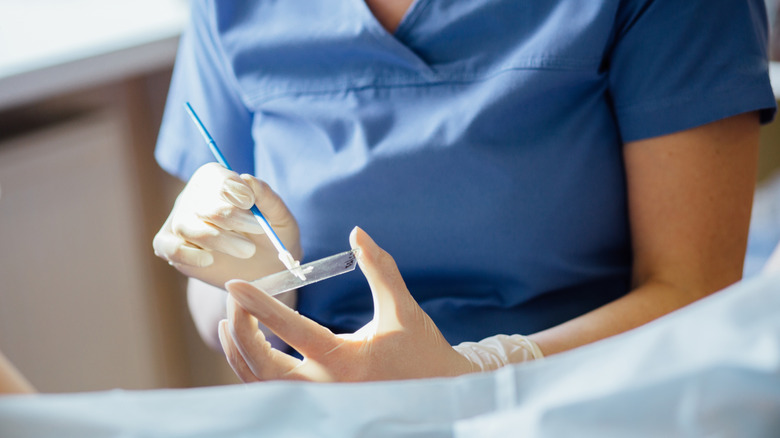What To Expect When You Book A Cervical Cancer Screening
Your gynecologist might have told you to get a cervical cancer screening, but do you really need this test? The answer is a hard "yes." In 2018, cervical cancer was responsible for 311,000 deaths worldwide, reports the World Health Organization. About 99% of cases are due to infection with the human papillomavirus (HPV). Regular screenings can detect abnormal changes in the cervical cells before they lead to cancer.
In a 2016 survey, only one-third of women were able to correctly identify the cervix and other reproductive organs on a diagram (per Vice). The cervix connects your vagina to the uterus. Think of it as a small tube made up of connective tissue. Its role is to prevent pathogens from entering the uterus and facilitate the passage of sperm into the fallopian tubes, explains a 2014 review published in Human Reproduction.
HPV infections and other factors may cause abnormal cervical cell changes. If left unaddressed, these changes can put you at risk for cervical cancer. Regular screenings, which may include PAP tests, HPV tests, or both, have the role to prevent this disease by identifying abnormal cells and high-risk types of HPV.
Cervical cancer screening can save lives
As discussed above, this type of cancer occurs when cervical cells become abnormal. Over time, they can grow and spread throughout the body. These changes develop slowly over three to seven years, explains the American College of Obstetricians and Gynecologists (ACOG). Regular screenings can detect abnormal cells and tissues before it's too late.
All women between 21 and 29 years old should get a Pap smear test every three years, recommends the Centers for Disease Prevention and Control (CDC). If you're 30 to 65 years old, try to get tested for HPV every five years or book a Pap smear every three years. Another option is to get both tests every five years, depending on your health needs. Women over the age of 65 don't need to be screened anymore unless they're at risk for cervical cancer.
Note that HPV can be transmitted through skin-to-skin contact, too, says the University of Michigan. That's why you should get regular cervical cancer screenings even if you're not sexually active. The University of Michigan warns that women with HPV-related cervical cancer are at higher risk of developing vulvar cancer. Moreover, high-risk HPV strains may cause cancers of the throat, anus, vagina, and other organs.
Both tests are minimally invasive
Both Pap and HPV tests cause little or no pain and minimal discomfort. The American Society of Clinical Oncology (ASCO) recommends having the Pap test at least five days after the end of your period. Refrain from sexual intercourse for two or three days before cervical cancer screening. Avoid vaginal medications and creams, tampons, contraceptive foam, and douches for at least two days prior to the test. These products can alter the vaginal flora, affecting your test results.
The screening will take place in your doctor's office. First, your gynecologist may ask a couple of questions about your health and lifestyle habits. Next, you will lie on the exam table. Empty your bladder beforehand so you can relax your pelvic muscles during the test. The doctor will use a duck-bill-shaped device (speculum) to open the walls of your vagina. This will allow them to gently scrape cells from your cervix and then check them under a microscope. They may use the same sample or take a different sample for the HPV test.
Most patients receive the test results within three weeks, according to the CDC. Abnormal results don't necessarily mean that you have cancer, but they require further investigation. LSILs (low-grade squamous intraepithelial lesions), for example, are considered abnormal Pap test results. These lesions may be due to an HPV infection, explains ACOG. Depending on your test results, the doctor may recommend a new screening or other tests, such as a biopsy or colposcopy.


